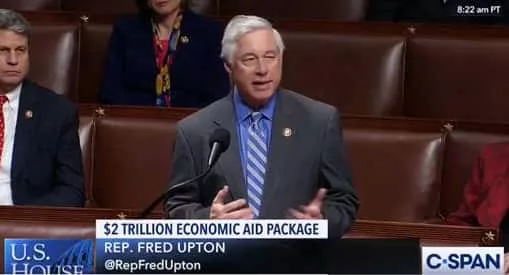Your United States Congress has finally finished the battle and passed a bipartisan bill that will send you money, arrange for billions in loan forgiveness grants and a lot more.
Congressman Fred Upton joined colleagues today in voting as the U.S. House passed the Coronavirus Aid, Relief, and Economic Security (CARES) Act, which will now advance to be signed by President Donald Trump into law.
Upton says, “Last night, I drove from Michigan to Washington, D.C. to ensure I was there in person to advocate for this historic bill and make sure it got done. Despite one colleague who tried to delay this overwhelmingly bipartisan legislation – and therefore disrupt when Americans would start seeing relief – we had a quorum of members present and were able to get it across the finish line. Folks need help right now, and the CARES Act delivers that help.”
The Congressman adds, “The coronavirus stimulus bill will provide immediate relief to Michigan families, workers, hospitals, and businesses as we all work to overcome the coronavirus crisis. Not only does the legislation help protect job security in the short-term for small businesses, it also allows for direct financial assistance to individuals and enhances unemployment insurance. The American spirit remains strong – we will get through this crisis, just as we have always done.”
Upton spoke on the U.S. House floor earlier today in support of the legislation, which includes:
- $350 billion in loan forgiveness grants to small businesses and non-profits to maintain existing workforce and help pay for other expenses like rent, health insurance and other employee expenses, mortgage, and utilities
- Immediate cash assistance to individuals and families
- Additional regulatory relief at FDA and CDC for market-based testing solutions and essential supplies such as testing kits, ventilators, PPEs, reagent supply, and hospital conversion
- Expanded unemployment benefits to include part-time, self-employed, contract, and gig economy workers
- Extended unemployment benefits for an additional 13 weeks — at 100 percent levels
- Employee retention tax credit to keep Americans in their jobs
- Low-or-zero interest loan program to businesses willing to keep their employees in their positions during the coronavirus crisis
- Loan deferral and forbearance for individuals and businesses of all sizes, during the crisis (e.g. mortgages, lines of credits, student loans, and other qualifying loans), keeping those lines of credit open which are necessary to allow employers to get back on their feet






